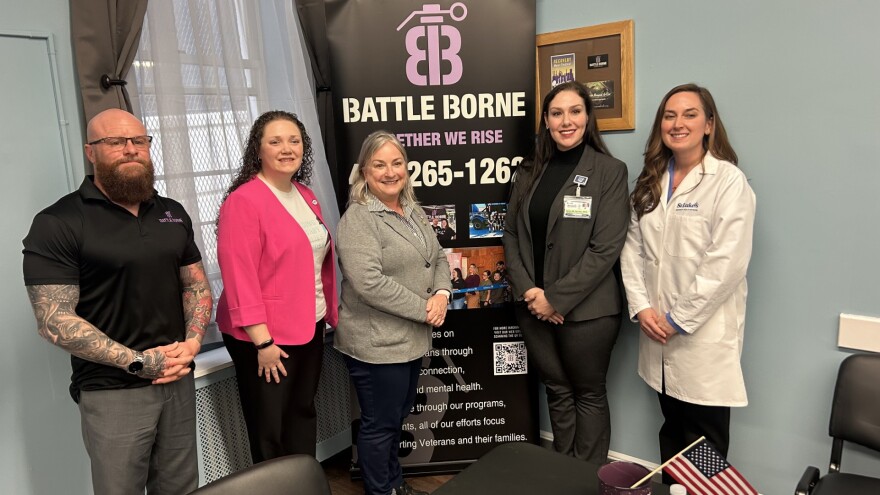ALLENTOWN, Pa. — Veterans and military family rights were at the forefront Wednesday as U.S. Rep. Susan Wild held a roundtable discussion with veterans groups and doctors.
The conversation centered around IVF, also known as in vitro fertilization, and its accessibility for those who served. IVF is assisted reproductive technology which helps families conceive a child.
“Veterans often will sustain an injury that impedes their ability, whether it's a sperm or an egg to conceive a child and that's an invisible injury that most of us wouldn't ever see or know about, but in fact, it happens, and they often might need IVF,” said Wild, D-Lehigh Valley.
Wild serves Pennsylvania’s 7th Congressional District, encompassing Lehigh, Northampton and Carbon counties and a piece of Monroe County.
She was joined by Julie Eshelman, founder and CEO of the Building Military Families Network; Christopher Yarnell, president of Battle Borne; and St. Luke’s University Health Network physicians Dr. Hannah Anastasio and Dr. Jaclyn Davolos.
Anastasio practices maternal-fetal medicine at St. Luke's and described the health care provider's priority as "providing excellent care to those who are trying to build their family.”
“This is something that's near and dear to our heart, we take care of a population of veteran patients, we accept TRICARE insurance and this is something that directly affects our patients as far as their ability to create a family,” said Davolos, the network’s obstetrician-gynecologist.
Wild initiated the conversation held at Battle Borne, a veterans’ resources center in Allentown, following the Alabama Supreme Court decision in January stating that in vitro fertilization should not be permitted. Then last week, four members of Congress, from the Freedom Caucus, wrote to the VA objecting to the VA providing expanded IVF access to veterans.
Wild said she spent the last year drafting a bill to protect in vitro fertilization and other assisted reproductive technologies, following the Dobbs decision. That bill, the Access to Family Building Act, would protect access to assisted reproductive technologies (ARTs), including IVF, nationwide.
The roundtable was in response to many of the recent rulings and to garner support for her bill, as she said military families often relocate to places the military needs them without a choice in the matter.
“These are the people that are serving our country, defending our country, and they wouldn't have access."Congresswoman Susan Wild (D), Pennsylvania’s 7th Congressional District
“If they are in the middle of going through IVF, move to a state that has outlawed IVF, they are just completely out of luck here,” she said.
“These are the people that are serving our country, defending our country, and they wouldn't have access. The people have to move for a lot of reasons. You don't always get to live in a state that has favorable state laws.”
Davolos concluded by adding, “These are decisions and conversations that should stay in the doctor's office. This is not a place for politics. This is not a place for opinion. This is growing families and the best way for you.”
Eshelman founded the Building Military Families Network following her struggles with fertility.
She said her presence at the roundtable was to support the families going through a similar experience.
“I really believe that Protecting Access to IVF is so important, especially for our military community, because we don't control where we're stationed,” Eshelman said.
“It comes down to the needs of the military, where they send us and so sometimes we get sent to states that might have restrictions and that poses challenges.”

Eshelman shared her story at the roundtable discussion while the physicians walked the group through what the IVF process entails.
“These are decisions and conversations that should stay in the doctor's office," Davalos said.
"This is not a place for politics. This is not a place for opinion. This is growing families and the best way for you."
Wild’s bill to help protect IVF rights gained bipartisan support from over 150 members of Congress and is endorsed by numerous reproductive health organizations.


